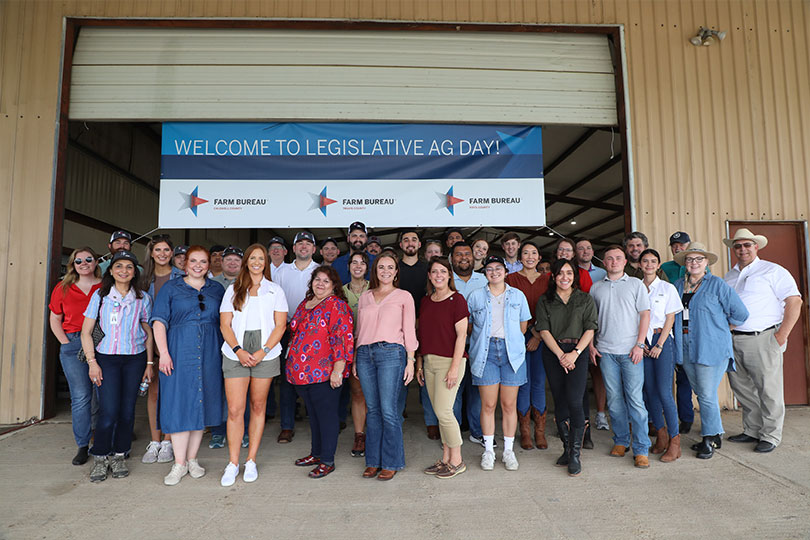By Shelby Shank
Field Editor
Texas legislators and legislative staff got their boots dirty during a trip to the farm to learn more about agriculture.
Hays, Travis and Caldwell County Farm Bureaus worked with the Luling Foundation and the Texas Ag Council to host the Legislative Ag Day on May 8.
Several Texas legislators and over 60 staff members for Texas senators and representatives attended the event, growing a better understanding of agriculture and the issues facing the industry.
“There are a thousand people a day moving to Texas. A lot of them are coming from big cities, and they probably don’t have any connection with agriculture,” Joe Morris, Travis County Farm Bureau president, said. “We’re trying to bring legislators and their staffers out to the farm and show them around, so they can gain an understanding about what it takes to put food on the table and clothes on your back.”
This year’s event was held at the Luling Foundation, a model farm established over 90 years ago. The farm has been a longtime advocate for Texas agriculture and has a long history of diverse agricultural practices.
“It’s important for legislative staff to see, meet and speak with farmers and ranchers. This event gives legislators and their staff firsthand experience and visualization of what farmers and ranchers do,” Makayla Arthur, senior policy analyst for Sen. Brian Birdwell, said. “It bridges the gap of knowledge between a person who’s never experienced or been exposed to agriculture with a person who lives it every day.”
The day’s activities included various demonstrations to showcase different aspects of farming and ranching in Texas.
A demonstration on beef cattle production showed different feed rations the Luling Foundation feeds its cattle, as well as discussion on grass-fed and grain-finished beef. Questions centered around the current state of the cattle market and the impact ongoing drought and recent wildfires have had on cattle herd numbers.
A sheep production presentation showed participants the differences between wool and mohair.
“I think one of the things we take for granted is the clothes we put on every single day,” Jaime Villarreal, chief of staff for Sen. Carol Alvarado, said. “We think of food as something that will always be around, but then we think about the labor it took to grow or raise that food. A lot of the times, unless our clothes are a synthetic material, it’s coming from another big part of the agriculture industry, like sheep production.”
Rep. Stan Kitzman noted Texas is growing increasingly urban.
Kitzman’s district includes Waller, Austin, Fayette, Colorado, Wharton and part of Ford Bend counties, covering areas that have agricultural production but are facing urban sprawl.
“What was already a difficult industry to survive in, we find that our resources for agriculture are being taxed even more, especially with the loss of our agricultural land,” Kitzman said. “We have less and less land to produce our food and fiber on, and it becomes more important that those who make the laws and the legislature understand how critical having our food and fiber grown here is to our food security.”
Participants also learned about forestry, water, viticulture and other challenges facing farmers and ranchers.
Legislative Ag Day was an opportunity to cultivate relationships with legislators and their staff and answer any questions they might have about agriculture.
“It’s really important for staff members like myself to attend events like the Legislative Ag Day,” Lauren Hadley, chief of staff for Rep. Gina Hinojosa, said. “We represent downtown Austin and don’t have a lot of farmland in our district, but issues that happen in rural areas impact our district. So, it’s good for us to have the opportunity to see and gain knowledge on agriculture and how it’s impacting our constituents.”
The day closed with a skeet shoot demonstration, giving the legislators and staff an opportunity to try their hand at the sport and learn about gun safety.
“When our farmers and ranchers prosper, the state prospers. I think Texans recognize farming and ranching is important to the state and helpful for our economy,” Villarreal said. “We need to ensure that farmers and ranchers have the resources to continue to be successful.”


Leave A Comment